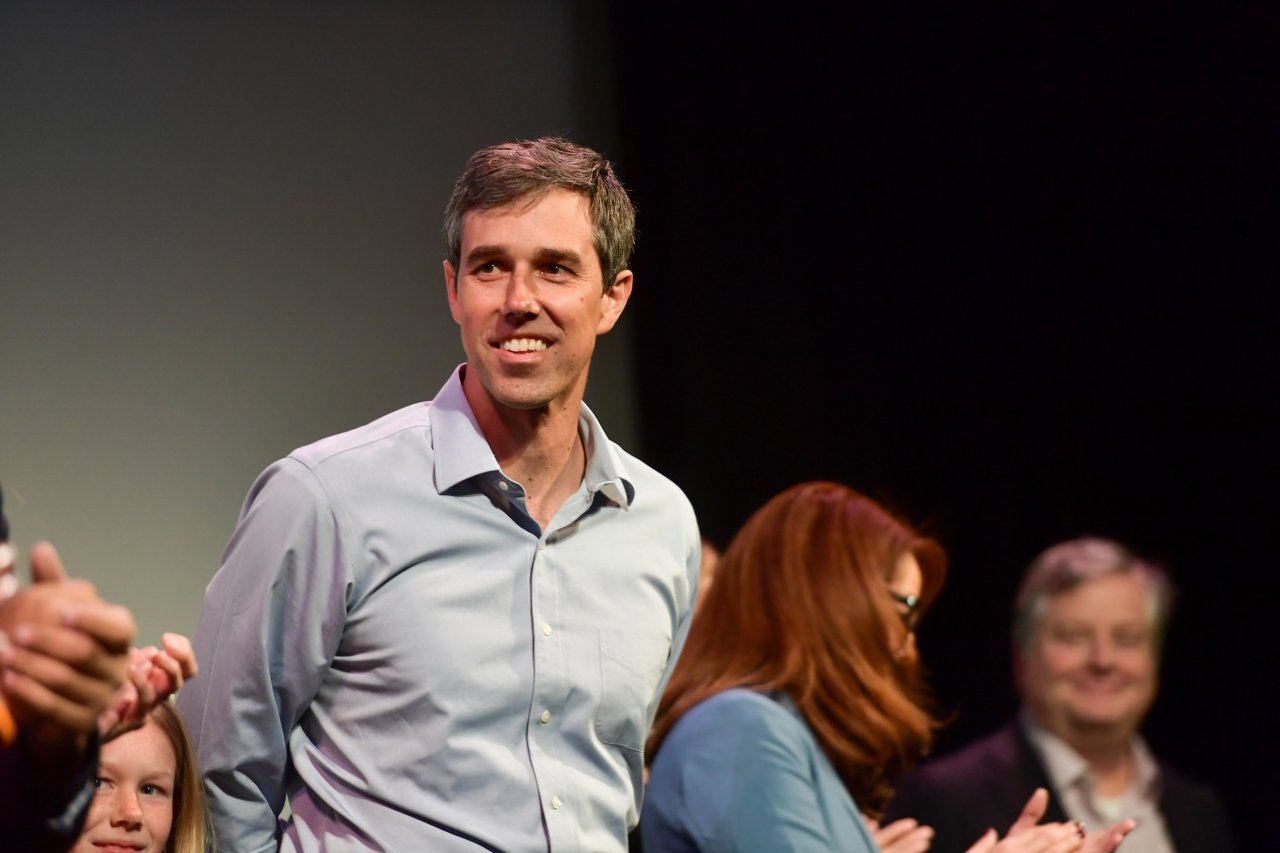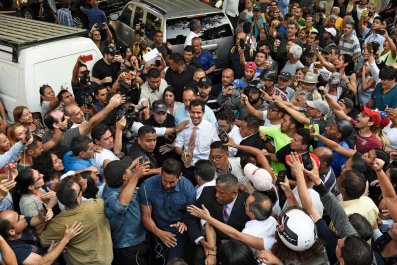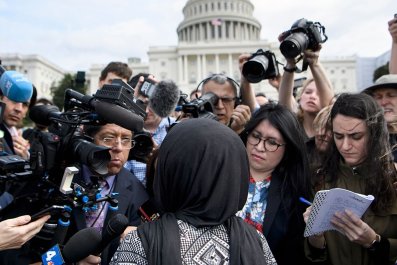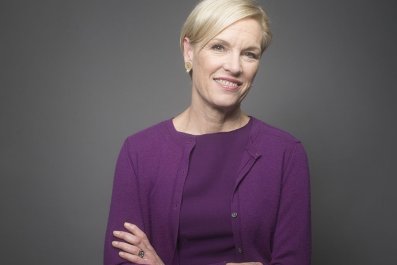I helped prepare Senator Ted Cruz for his 2018 debates, and here's what I learned: Beto O'Rourke is the toughest candidate I ever prepped against and one of the most impressive I've ever seen. The media might not recognize his skills, but voters do — and will in 2020. In fact, being underestimated may be one of his biggest advantages.
For those who believe he's a lightweight, that his social media habits are not presidential material and he doesn't have enough experience or gravitas, I'm here to set you straight. What he managed in Texas in his race against Senator Cruz was not a fluke: Beto got out the vote in ways none of us expected. His four million votes surpassed Hillary Clinton's 3.87 million votes in 2016, which had been the highest total ever achieved in Texas by a Democrat.
In a state that's redder than a red light, a state where a Democrat hasn't won a statewide election since Governor Ann Richards did in 1991, Beto lost by a slim margin: 50.9% to 48.3%. On that basis alone, he's the primary frontrunner.
How will he connect in Michigan? And Wisconsin? And Iowa? He ran the table in Harris County so my guess is, he can succeed in all kinds of environments.
How do I know? I spent lots of time studying Beto. I began by going to the game film. And my goodness, is there a lot. He livestreamed his life the way high school girls livestream theirs. Beto drinking coffee. Beto bowling. Beto eating a hamburger. Beto riding a skateboard. Even Beto doing his laundry. But what most interested me were the livestreamed town halls.
It made studying Beto easy. So did the endless gushing profiles by every website, publication and media outlet imaginable, all essentially anointing Beto as the next Bobby Kennedy.
In May of 2017, Vanity Fair published a 1,993 word profile with this title: "Meet the Kennedyesque Democrat Trying to Beat Ted Cruz." In February, the New York Times ran their own puff piece, running 1,690 words. Time Magazine followed with a 1,658 word press release masquerading as a news report. On July 9, Politico ran a 4,800 word profile, and Town and Country weighed in with a 3,823 word profile. You heard that right: Town and Country! Buzzfeed would follow with an 8,021 word piece, and not to be outdone, Texas Monthly ran an 8,373 word love letter.
The photos that accompanied the coverage had the feel of a Ralph Lauren ad. Beto always looked great. And made looking great easy. And always, he looked like a man of the people. I say all of this not to slight Beto. On the contrary, Beto — it was clear almost instantly — had real star power. And that matters.
Democrats dismissed President Reagan's star quality, and Republicans dismissed President Obama's. Critics miss the point about star power. In politics, it's a big deal. It can't be taught. Or bought. You either have it. Or you don't. Beto had it.
Beto loved the camera. And the camera loved him. More important, the people loved him. The people who attended those town halls he live streamed were not mere Democrat activists or the party faithful. They were, dare I say, fans. And having fans is more important than having voters.
He had real talent on the stump, and didn't use prepared remarks. He did what great pastors do when they get comfortable: he preached on his feet.
His speeches had the feel of a religious revival, without any trace of Elmer Gantry sanctimoniousness. Always, he framed things simply and in a moral dimension. And not with the anti-capitalist shrillness of Bernie Sanders, Elizabeth Warren or Alexandra Ocasio-Cortez.
Beto was not an angry candidate. He was the opposite. I might even say he was a joyful candidate, and in this age of anger and resentment, this made Beto different.
Beto wasn't just a star on the stump, but off the stump, too. I watched him talk to people who lined up for a quick selfie, and he turned even those small moments into something personal. Meaningful.
Unlike President Obama, an introvert who didn't seem to care for the palm-pressing, Beto seemed to draw energy from interacting with the public. In that sense, he had what Bill Clinton and George W. Bush had — an instinctive feel for the interpersonal part of campaigning. The retail nature of the business.
Beto was a natural on the debate stage because he understood something profound about the ritual. It isn't actually a debate. It's an audition. It was less like Firing Line and more like American Idol. As often as possible, he kept a smile on his face and his eye on the camera, hoping the people watching at home would like him more than my guy.
Beto had advantages that critics thought were problems. He didn't have a speechwriter, didn't have any outside consultants, and he didn't rely on big data. That made him dangerous. And difficult to prepare against in battle.
No one understood this better than President Obama. "What I liked most about his race was that it didn't feel constantly poll-tested," Obama said on The Axe Files about Beto's campaign. "It felt as if he based his statements and his positions on what he believed. And that, you'd like to think, is normally how things work. Sadly it's not."
Beto did things his way. When he committed to visiting all 254 counties in the state of Texas, some people dismissed him and others wrote it off as a gimmick he'd never pull off. But Beto was serious, logging tens of thousands of miles covering a state that's so big, it could house two Californias, four Floridas, 28 Vermonts or 221 Rhode Islands.
Why'd he do it? Because he wanted to win over voters in places that others would have written off. How better to change someone's mind or heart than to meet them?
The candidate did a lot of the driving himself, with aides in tow. He often spoke about how his never-ending tour of Texas felt a lot like his days managing his own punk band — called Foss — that he'd assembled in El Paso. He and his bandmates started a record label and booked tours, traveling the country and parts of Canada during his summers off from Columbia University, where he majored in English and captained the crew team. O'Rourke wasn't the best musician in the band, but he happily told reporters that he was the best roadie.
That too was a big advantage. Many critics made fun of the not-so-proficient outtakes and videos of the band. But Beto learned important things in that period of his life. He learned how to command a stage. How to play with an audience. And how to let the audience play with him. No amount of coaching or consultants can teach that.
Beto had a relentless energy. He was fueled by ambition but seemed to enjoy himself. That, I suspect, is something he learned on the road with his band mates. If a band isn't having fun, what's the point?
Beto was good at teasing himself. He often brought up the fact that he was still working hard on one voter in Texas: his mom, who was a Republican.
And he could be funny, joking about the low approval ratings of Congress. "Congress has an approval rating of around nine percent," he said. "Communism ten percent. Gonorrhea eight percent. We're right in the middle."
Beto was a prodigious fundraiser, reeling in an astonishing $80 million. And more than $61 million came from ActBlue, an online portal for small dollar supporters.
Beto had one last advantage: He had a real story about his roots. His El Paso story. He didn't always love his hometown, and like so many of us growing up, couldn't wait to escape — and leave tensions with his father behind. After wandering for a time and trying life in Brooklyn, he came to a life-altering conclusion: he wasn't a New Yorker after all. The journey home is a big theme in American life. And in Beto's. His story — although I heard it ad nauseum — was powerful. Proof you can indeed go home again. Beto lives a few blocks from the house he grew up in.
Sounds a lot like the life of a New Jersey guy named Bruce Springsteen, who had father problems of his own, and a hunger for the road. Including an anthem he wrote that might as well be Beto's: Born to Run.
Lee Habeeb is VP of content for Salem Radio Network and host of "Our American Stories." He lives in Oxford, Mississippi, with his wife, Valerie, and his daughter, Reagan.
The views expressed in this article are the author's own.










